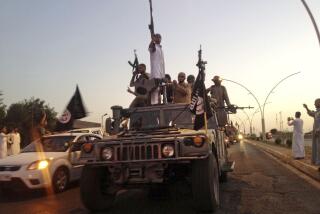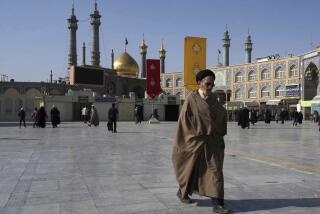Exiled Iraqi Ayatollah Maneuvering to Lead Shiites Against Hussein : Muslims: Mohammed Bakr Hakim professes a belief in democracy. The extent of his following is unclear.
- Share via
While thousands of Shiite Muslim rebels reportedly rise up in spontaneous opposition to the regime of Saddam Hussein in southern Iraq, an Iraqi ayatollah exiled in neighboring Iran is attempting to position himself as their spiritual and perhaps political leader.
Although it is unclear outside Iraq just how much of a following the Ayatollah Mohammed Bakr Hakim has among armed rebels, his family name is so well known that even as he was conducting media interviews from his Tehran offices this week, refugees leaving Iraq said they had heard he was leading insurgents in Basra.
Hakim, a 52-year-old religious scholar little known in the West, is a fundamentalist in the tradition of Iran’s Ayatollah Ruhollah Khomeini. Khomeini offered him a residence next door to his own home in Tehran when Hakim fled Iraq at the outset of the Iran-Iraq War in 1980, according to Hakim’s official biography.
However, unlike some other Shiite fundamentalists, Hakim has professed a belief in democratic elections. As leader of the Supreme Assembly of the Islamic Revolution of Iraq, an umbrella organization, he has signed a manifesto agreed to by groups including Kurds and Communists that calls for a transition government followed by free elections if President Hussein falls.
“We have not established a government in exile, because we believe the Iraqi people should elect their own government,” Hakim told The Times in a phone interview. “The people will elect the type of government they want. We believe they would elect an Islamic government. If they don’t, we would hope to enlighten them.”
Former Iranian officials who fled Khomeini’s rule have attacked Hakim’s brand of fundamentalism. The late shah’s last prime minister, Shapour Bakhtiar, declared in Paris this week: “There is no such thing as a moderate mullah (Islamic clergyman). . . . They are not bent on taking Iraq but on taking over Islam and marching on Jerusalem.”
However, Middle East experts and Iraqi opposition groups generally agree that the Iraqi ayatollah would be unlikely to implement in Iraq the sort of fundamentalist regime that swept into power in Iran--even if he tried to.
“I don’t believe the (Hakim) group . . . can seek to imitate that experience in Iraq, basically because of the difference in religious and ethnic composition of the two countries,” said Taleb Shabib, a former Iraqi foreign minister who lives in New York and is now working closely with the pro-Western Saudi Arabian government.
Iran’s population is 95% Shiite, while Iraq’s is just 55%. Iranians are Persian, while Iraqis are Arabic, with a pan-Arab influence that tends to act as a counterweight to religion. Iran’s population was perhaps 30% literate at the time of the overthrow of the shah. Iraq has one of the highest literacy rates in the Middle East, at least 75%, experts say.
“In the early days of the Iranian revolution, Iraqis in exile in Tehran tried to stir up the (Shiites) in Iraqi holy cities and failed,” said New York-based Middle East expert Andrew Whitley of Middle East Watch. “Iraqis have always been more secular in their practice of religion than Iranians, and they are also wealthier.”
“Americans have confused (Iraqi) Shiites with Islamic fundamentalists,” said Dr. Ridha Hajjar, an Iraqi-American physician who leads the Ahlul-Beyt Mosque in Pomona. “The anger of the Iranian revolution was related to political bitterness over the shah, not the Shiite religion.”
Although Hakim is a respected name, he is not the highest Iraqi Shiite clergyman. Higher ranking and reportedly more open to non-religious governments is the grand ayatollah, Mohammed Yasin Khoi, a man now in his 80s who has managed to remain inside the country by tempering his criticism of Hussein, experts say.
Hakim is a member of Iraq’s most prominent Shiite family. His grandfather, Muhsin Hakim, once the spiritual leader of all Shiite Muslims, died of natural causes while Hussein’s nationalistic Arab Baath Socialist Party rose to power in the late 1960s. Hakim’s father was executed by Hussein’s regime, which in May, 1983, arrested more than 80 male family members, killing six of them. A family elder was forced to watch the executions.
Muhsin Hakim’s sons were forced to flee the country. Mohammed Bakr Hakim established himself in Tehran. But the eldest, the reportedly charismatic Mahdi Hakim, fled to London in hopes of remaining independent of foreign powers. There he and noted Shiite scholar Dr. Bar Aloom established one of the largest Islamic centers in Europe.
Mahdi Hakim was assassinated in the lobby of a Hilton Hotel in Khartoum, Sudan, in 1988. Today, his colleague Aloom, a Shiite scholar, is considered to be at the liberal end of the Shiite spectrum.
Still unclear is how much control Hakim or any Shiite leader has over what he has labeled the popular intifada , or popular uprising, in Iraq.
“No power outside Iraq is doing all this (the uprising),” Hakim said this week. “It is the people themselves. . . . But I cannot say there is no connection between the Muslims of Iraq and the (Supreme Assembly), because the people who are carrying out the uprising are very well represented in our council.”
Hakim said he is collaborating “militarily” with Kurdish leaders who are heading uprisings in northern Iraq.
Under the aegis of Hakim’s Supreme Assembly is an army of former Iraqi prisoners captured by Iran during the Iran-Iraq War. Unconfirmed reports put the size of the troops in the tens of thousands.
Since the first reports of revolt, Hakim’s followers claim to have sent hundreds of armed exiles back into southern Iraq to join what they describe as “the popular uprising.” Officials of the Al Dawaa (“the Call”) Party, the largest and most militant of five factions overseen by Hakim, said exiles are returning at remote crossings along the Iraq-Iran border, hoping to link up with rebels in strife-torn cities in southern Iraq.
More to Read
Sign up for Essential California
The most important California stories and recommendations in your inbox every morning.
You may occasionally receive promotional content from the Los Angeles Times.













